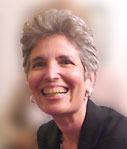Reforming child welfare is hard, but it is not impossible to make a difference, says Olivia Golden, an author and child/family expert who will speak on the topic Oct. 14 at the School of Social Work.
The challenge for child welfare agencies is balancing parents’ autonomy and children’s safety, she says.

“The agency must walk a fine line as it seeks to watch out for kids and honor the value of family independence from government oversight and control,” says Golden, whose 2:30 p.m. lecture will be in the Educational Conference Center. The event is free and open to the public.
Vivek Sankaran, a clinical assistant professor of law at the Law School who will lead a discussion during the lecture, says parents are essential as partners in child welfare reform.
“Successful reforms all across the country have been based on the notion that most parents want what is best for their children and are truly the experts on their children’s needs,” says Sankaran, who is director of the Detroit Center for Family Advocacy. “Child welfare agencies need to embrace this view and work with parents instead of against them.”
Golden is a fellow at the Urban Institute — a nonpartisan economic and social policy research group — and was director of the Child and Family Services Agency of the District of Columbia from 2001-04. She served in two presidentially appointed positions in the U.S. Department of Health and Human Services, first as commissioner for children, youth and families, and then as assistant secretary for children and families.
She also served in 2007 as director of state operations for New York, overseeing the management of all state government agencies and founding the children’s cabinet.
Another reason reform is hard, Golden says, is that some families face devastating problems, like depression, substance abuse, domestic violence and poverty.
“It’s especially hard to address those problems in the United States because, compared with other Western countries, we don’t have some basic universally available services that could help families,” she says. “Having access to health care, for example, might prevent a family from sliding into a situation where the child welfare agency must step in.”
Child welfare systems nationwide have improved in recent decades, such as nearly doubling of foster care adoptions — to nearly 50,000 a year — and “conscience steps” by elected leaders to provide resources to adoption parents for special needs kids, Golden says.
Guardianship opportunities also have increased, especially among relatives and grandparents who can offer a permanent home while not terminating their child’s parental rights through adoption.
The best solution for children entering the system is finding permanent homes and not having them indefinitely in government care, Golden says.
In her new book, “Reforming Child Welfare,” Golden points to how children in Alabama, Utah and Washington, D.C., are much better off in measurable ways. Social workers in those states visited children more frequently, knew children and families better, and worked closely with them and people important in their lives to develop plans for their futures, she says.

